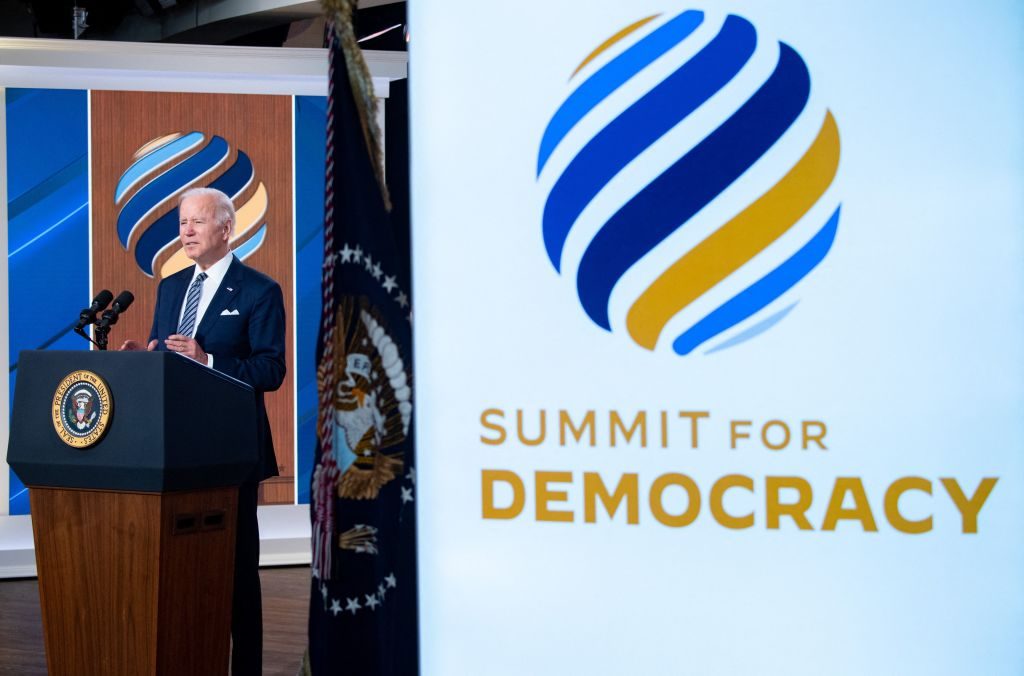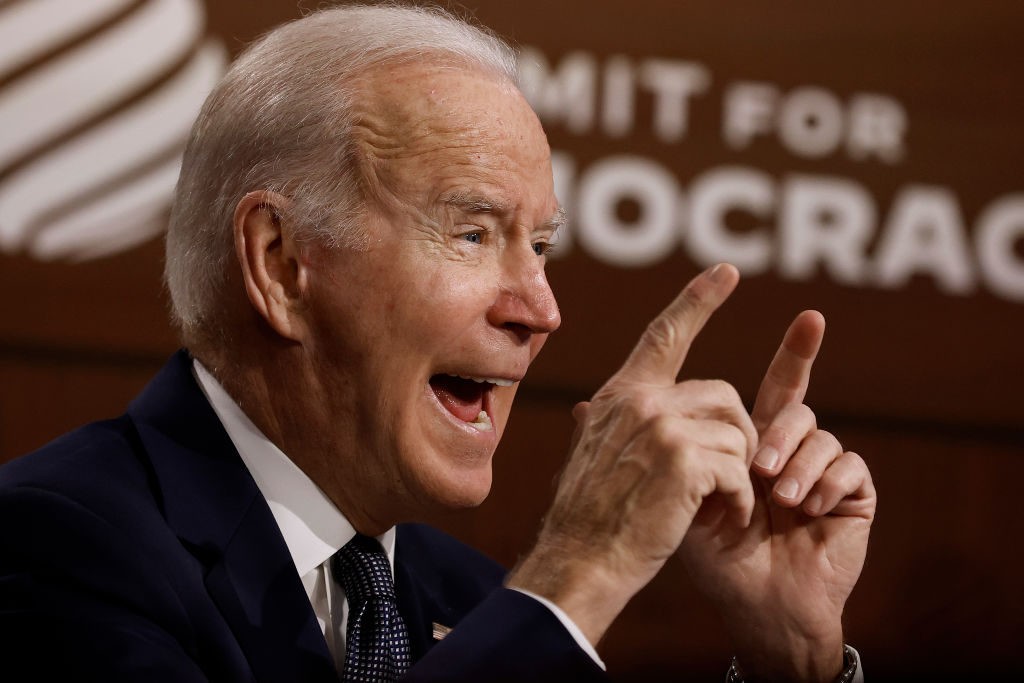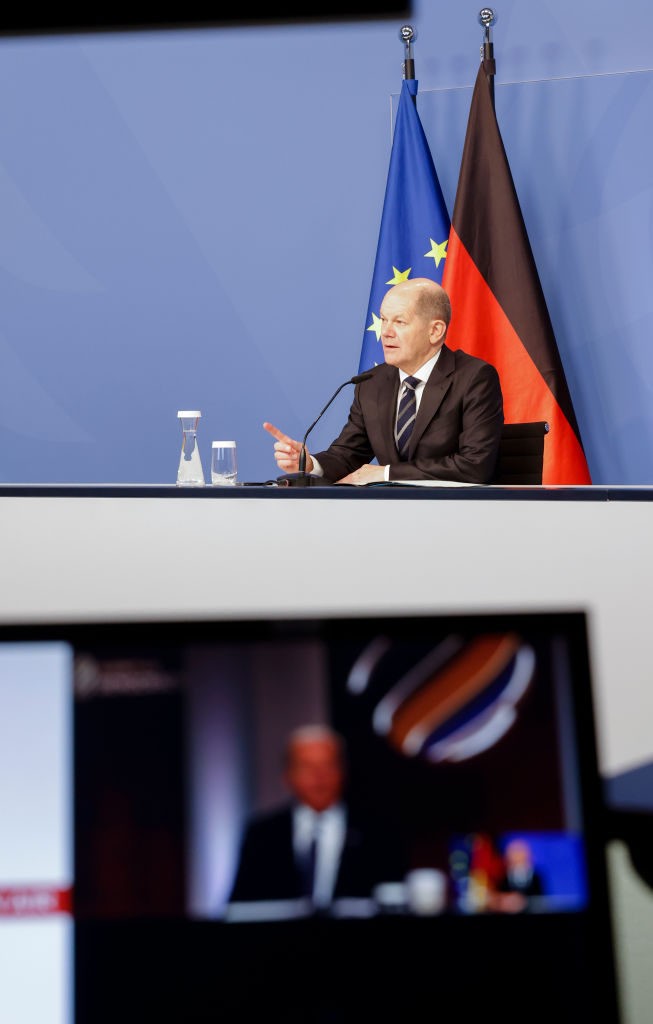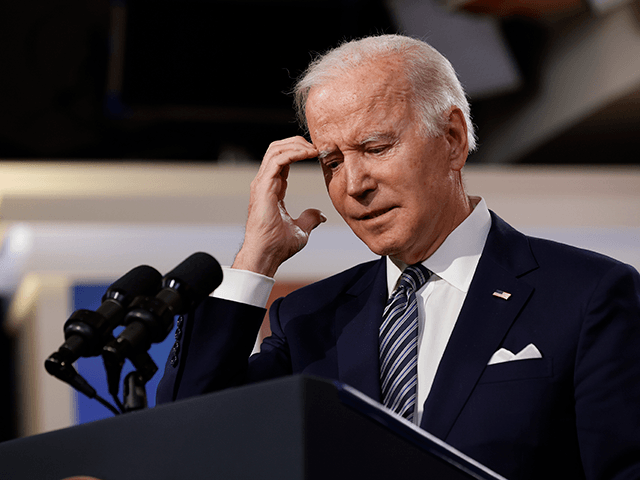President Biden’s “Summit for Democracy” on Thursday and Friday was a spectacular disaster, an embarrassment to the free world at precisely the moment when democracy needed to demonstrate bold confidence – and basic competence – against the rising tide of authoritarianism.
The hideous concluding act of Biden’s farce was the panicked termination of Taiwanese minister Audrey Tang’s video feed when she attempted to display a map that showed her island and China in different colors, visually implying they are not the same nation. The map colors indicated freedom in each respective country, however, and nations no one would confuse with China, including Vietnam and Laos, also appeared the same color as China – clearly showing a statement of sovereignty was not the intent.
The Biden team cut off Tang’s video, replacing her presentation with a disclaimer stating “any opinions expressed by individuals on this panel are those of the individual, and do not necessarily reflect the views of the United States government.”
The State Department claimed Tang’s treatment was a “technical issue” and said cutting her off was an “honest mistake,” but White House sources later admitted to Reuters it was an “internal overreaction” prompted by a blizzard of anguished emails between administration officials terrified of offending the Chinese.
Tang was participating in a panel discussion about the rise of “digital authoritarianism.” The Biden administration ended up giving a very convincing demonstration that digital authoritarianism is indeed a serious threat, and they have no idea how to contend with it.

U.S. President Joe Biden speaks during the closing remarks of the virtual Summit for Democracy in the Eisenhower Executive Office Building, adjacent to the White House, in Washington, DC, December 10, 2021. (SAUL LOEB/AFP via Getty Images)
The summit was boycotted by South Africa, the most important democracy on the African continent, in retaliation for another act of sheer panic: Biden’s hastily-imposed travel ban on South Africa and several of its neighbors after the discovery of the Omicron variant of Chinese coronavirus.
The summit was also sharply criticized for some of the nations that did attend.
Time magazine noted that over 30 percent of the 110 participants were rated only “partly free” by Freedom House, and several have been denounced as “not free” or outright “autocracies” by human rights organizations.
“Some of the omissions from the participant list are as puzzling as the inclusions. It’s not clear, for example, why strongmen like India’s Modi, the Philippines’ Duterte, and Brazil’s Bolsonaro made the cut, but Turkey’s Recep Tayyip Erdogan didn’t, when all of them have been wrecking democratic institutions in their respective countries with equal vigor,” Time grumbled.

U.S. President Joe Biden delivers opening remarks for the virtual Summit for Democracy in the South Court Auditorium on December 09, 2021 in Washington, DC. (Chip Somodevilla/Getty Images)
Freedom advocates were particularly irked by the participation of Philippine President Rodrigo Duterte, who they vilify for ruthlessly suppressing opposition media and waging an incredibly bloody “war on drugs.” Duterte’s administration is currently under investigation by the International Criminal Court (ICC) for human rights violations.
Duterte used the forum to claim Filipinos “fully enjoy” freedom of the press and “fair and honest elections,” a performance denounced by his critics as a whitewash enabled by the Biden administration. Reporters Without Borders ranks the Philippines 138th out of 180 countries for press freedom.
“The Philippines was the first republic in Asia and the inspiration of all Asian struggles for independence. Today, we have a vibrant democracy and an open and diverse society,” Duterte insisted.
Filipino-American activists mustered impressive numbers outside the Philippine Consulate in New York on Saturday to protest against Duterte’s invitation to the Summit for Democracy:
The failure of Biden’s summit reflects the free world’s increasing lack of confidence. Setting high standards and snubbing unfree or partly-free countries like Iraq or the Democratic Republic of the Congo might alienate them completely and drive them into China’s arms. Democracy in 2021 is not comfortable enough in its own skin to place high expectations upon its wobbly allies or democracy-curious autocratic guests.
“Here in the United States, we know that our democracy is not immune from threats. January 6 looms large in our collective conscience,” Vice President Kamala Harris said in her address to summiteers, dragging the political and media obsession with the Capitol Hill riot into the summit and making the U.S. seem even more uncertain of itself.
USA Today thought Harris’ remarks were the biggest news from the Summit for Democracy, at least until the Taiwan snub became the summit’s craven epitaph:
Critics worry that if President Joe Biden’s summit — and the broader effort to protect open societies — is to succeed, the United States must first lead by example and address its own failings.
“While President Biden is hosting a global democracy summit, our own democracy right here is falling apart,” said Cliff Albright, co-founder of Black Voters Matter, a voting rights group. “You can’t be the torchbearer for democracy while your own house is on fire.”
Other signs that America needs to focus inward, critics say: rampant misinformation fueled by former President Donald Trump and his supporters claiming the 2020 election was fraudulent; new restrictions on voting access; widespread public distrust in American leaders and institutions; and growing political polarization that has left Congress increasingly paralyzed.
Tighter rules for voting – mostly a return to the rules in place before the pandemic emergency – are protection for democracy, not a threat to it. Healthy democracies can handle “political polarization” just fine. Denouncing partisanship and Congressional deadlock as existential threats to democracy is tantamount to asserting that democracy only works when everyone agrees about everything.
It is not the fault of Donald Trump or his supporters that Western political elites increasingly view democracy, capitalism, individual rights, and the rule of law as excess cargo to be jettisoned at the first sign of turbulence. The Chinese coronavirus clearly shook the dwindling faith of Western politicians, journalists, and academics in self-government.

German Chancellor Olaf Scholz listens to opening remarks from U.S. President Joe Biden, at the start of the virtual Summit for Democracy at the Chancellery on December 9, 2021 in Berlin, Germany. (Michele Tantussi – Pool/Getty Images)
Our governing class cleaves increasingly to China’s view that only authoritarian governments are equipped to handle serious crises like the coronavirus pandemic and a growing list of “crises” they wish to be viewed as equal to the pandemic in threat level.
The New York Times noticed Chinese and Russian state mouthpieces seizing on the critique of democracy pushed by Harris and left-wing U.S. media outlets – or maybe it was the other way around, since China and Russia fired off their cheap shots a few days before the Summit for Democracy began:
A few days before President Biden’s Summit for Democracy, a virtual meeting of more than 100 countries that opened on Thursday morning, the Chinese foreign ministry released a stinging report about the American democratic system.
The “gunshots and farce on Capitol Hill have completely revealed what is underneath the gorgeous appearance of the American-style democracy,” the Chinese report said, citing the Jan. 6 riot. In a country where “money decides everything,” the report charged, “an entrenched political paralysis” renders governing impossible.
A spokeswoman for the Russian foreign ministry struck a similarly contemptuous tone in late November. “The United States claims the right to decide who is worthy of being called a democracy and who is not,” said the spokeswoman, Maria Zakharova, according to Tass, the state news agency. “It certainly looks cynical. I would say that it looks pathetic, given the state of democracy and human rights in the United States and in the West in general.”
A virtual forum that gives authoritarian regimes a chance to score propaganda points against the free world – while top U.S. officials and big corporate media largely agree with the authoritarian critique! – can only be counted as a setback for democracy.
Concluding the event by kowtowing to the speech codes of Communist China and pulling the plug on Taiwan, arguably the most imperiled free nation in the world, was the cherry of cowardice atop a double scoop of doom. The participants in Biden’s summit sounded like they were trying to convince themselves democracy might still be viable, provided they get to be in charge of it. As a sales pitch for representative government to the developing world, the summit was a catastrophe.

COMMENTS
Please let us know if you're having issues with commenting.